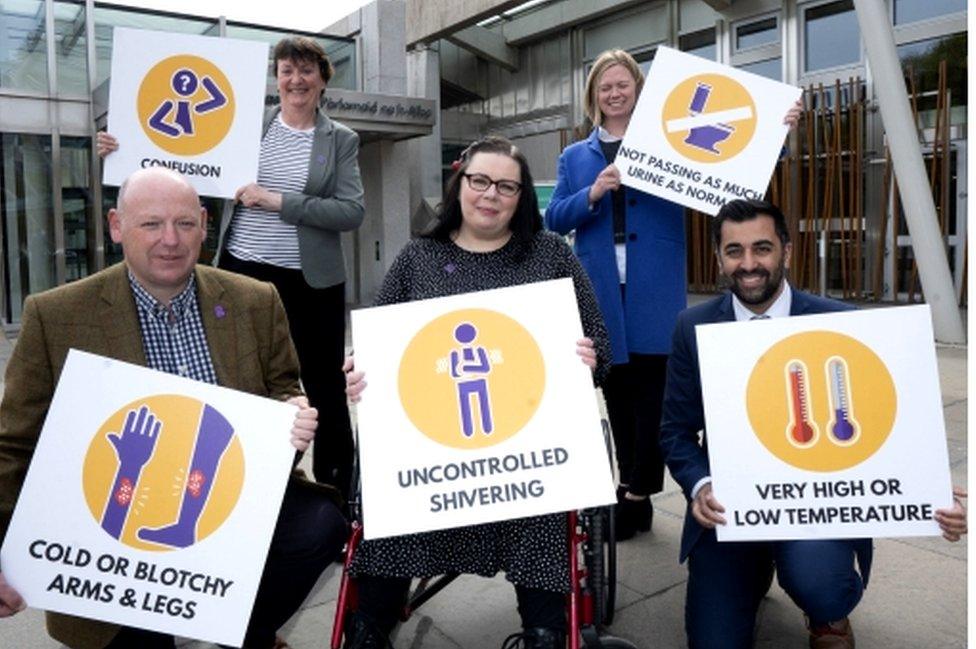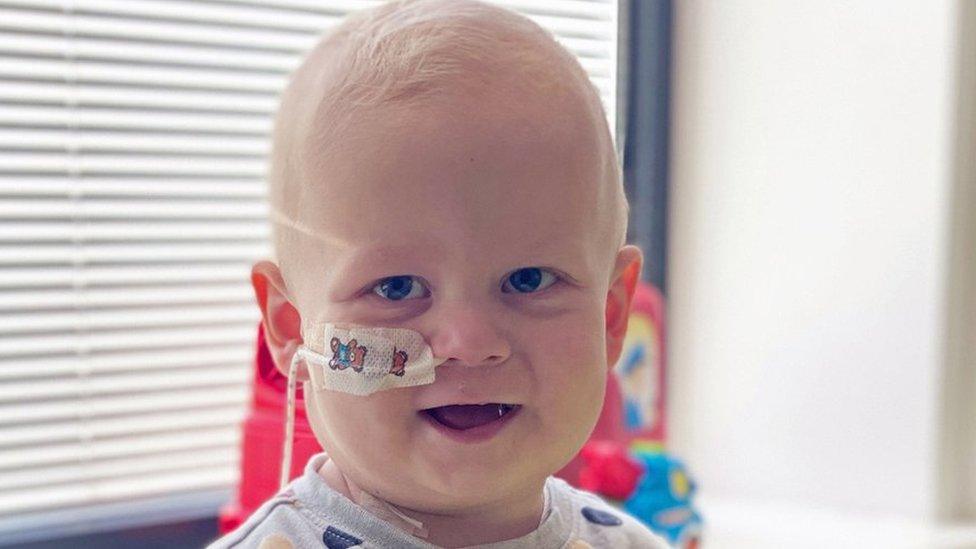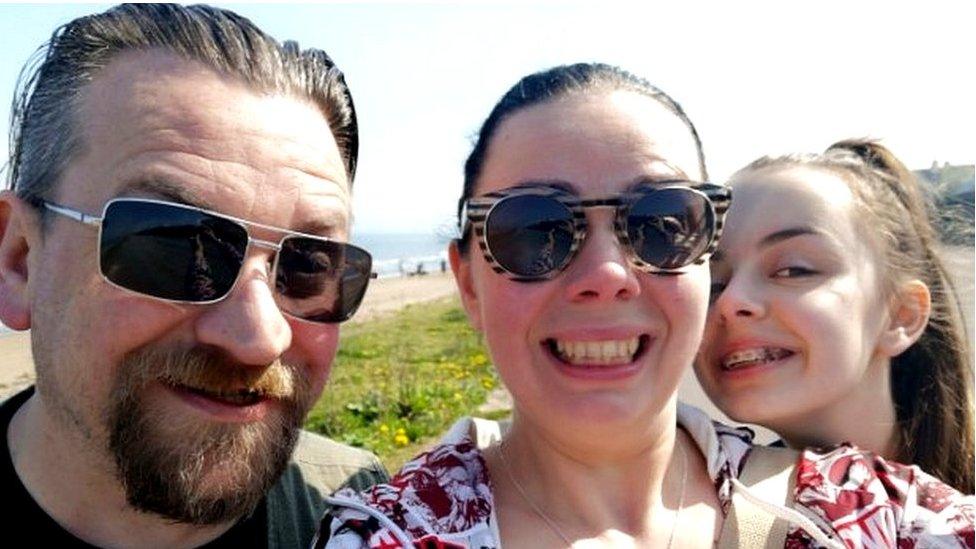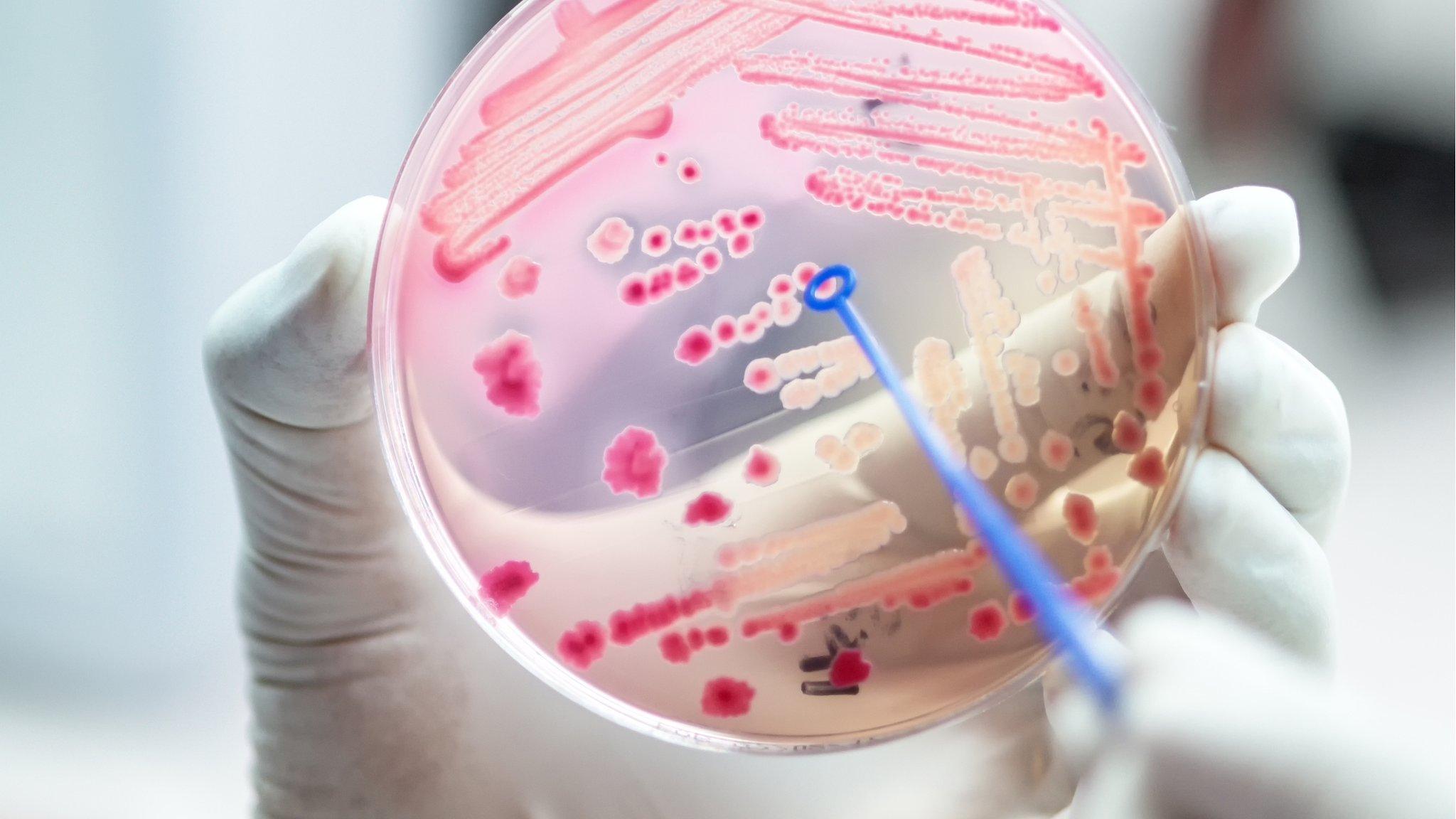BBC presenter got sepsis after doing awareness interview
- Published

Sarah McMullan was later told by doctors she was "very lucky" after she spent six days in hospital with sepsis
A BBC Scotland journalist has spoken about how she failed to spot her own sepsis despite interviewing a woman who nearly died from it just weeks before.
Presenter Sarah McMullan started feeling "really cold" during a morning shift but waited more than 36 hours to phone NHS 24.
She went on to spend six days in hospital, during which her temperature spiked to 40 degrees.
Sarah was told she was very lucky and admitted: "I should've acted sooner."
The broadcaster's illness in early October followed an interview she carried out for Sepsis Awareness Month for BBC Scotland's The Nine on 1 September.
Kimberley Bradley told the programme how she ended up in an induced coma for eight days after she contracted meningococcal septicaemia which had developed into sepsis, external.
Also known as blood poisoning, it is a rare but serious complication of an infection.
Sarah, 30, told BBC Radio Scotland's Drivetime programme: "She spoke through all of the symptoms and what to look out for and what to remember and when to get help and I did not remember them well enough."
A few weeks later the journalist was in the BBC Scotland studio at Pacific Quay in Glasgow for a morning bulletins shift when she started to feel cold and had goose bumps.
Sarah then confided in a colleague that something was "really not right".
Allow X content?
This article contains content provided by X. We ask for your permission before anything is loaded, as they may be using cookies and other technologies. You may want to read X’s cookie policy, external and privacy policy, external before accepting. To view this content choose ‘accept and continue’.
She added: "Then I started physically shaking and all the colour drained from my face.
"My lips were turning blue. My hands were chalk white, like you had been standing outside in winter for hours.
"There was no colour in my skin. There was no heat in my body. It was uncontrolled shivering and shaking."
The presenter also recalled how she felt "so spaced out".
Sarah said: "It was hard to make sense of what was happening. It crossed my mind 'Am I having some sort of panic attack?'
"It felt like something mentally might be happening to me because I was so confused and quite weepy actually."
She said this experience lasted about 40 minutes and then she went into the studio for her final morning bulletin.

Sarah became ill just weeks after interviewing Kimberley Bradley, centre, who joined Health Secretary Humza Yousaf to launch an awareness campaign earlier this year
At the time Sarah thought it may have been linked to the fact she had not had any breakfast or that it my have been the start of a cold or flu.
"Because the symptoms can be so many things I did not realise how unwell I was," she said.
After work, Sarah went to bed however when she woke up that afternoon she started to experience similar symptoms.
But although she started to feel unwell on a Wednesday morning she did not call NHS 24 until the early hours of Friday.
Shortly after arriving in A&E with a suspected kidney infection - which was later confirmed - Sarah was admitted as a category two patient.
She said: "Category one is life threatening so I was very unwell."
Spiking temperature
Sarah admitted she could not stop crying as she had no idea what was wrong with her.
She was put on antibiotics and morphine as medics battled to get her temperature down.
Sarah said: "It was spiking really quite quickly. It would go from about 37 to 40 within about 15 minutes.
"It was 40, on and off, for about two days."
Sarah initially spent five hours in A&E before she was moved to a ward.
Doctors told her she was fortunate that she attended on a quiet night when there were only 12 patients compared with 56 the previous day.
She said: "Had I had a longer time to wait I cannot imagine how much more unwell I would have felt."
'You have been very lucky here'
In total, she spent six days in hospital but is aware that she raised the alarm with very little time to spare.
Now back at work Sarah admitted: "It could have been a lot worse. That's what I was told on several occasions.
"The doctors kept saying to me 'You have been very lucky here'."
The broadcaster said sepsis never crossed her mind as the symptoms were so similar to other conditions and she was young, healthy and active.
She added: "I didn't want to bother people at the doctors or A&E but you absolutely should."
Asked if she had a message based on her experience, Sarah told Drivetime: "If you suffer any of these symptoms, like the spike in temperature or the uncontrolled shivering, just make the phone call and get help.
"It really is the difference between it being life or death in some instances."

What is sepsis?
Sepsis is also known as the "hidden killer" because it can be so hard to detect.
It is caused by the immune system going into overdrive. Instead of just fighting an infection, it starts attacking other parts of the body too.
Ultimately it causes organ failure. Even survivors can be left with long-term damage and disability.
Bacteria and viruses that cause diarrhoeal infections or lung diseases are the leading triggers of sepsis.
In 2020 a comprehensive analysis of sepsis found it causes one in five deaths in the world.
Sepsis: What is it - and how to spot it?
What are the symptoms of sepsis?
In adults:
slurred speech
extreme shivering or muscle pain
passing no urine in a day
severe breathlessness
high heart rate and high or low body temperature
skin mottled or discoloured
In children:
a mottled, bluish or pale appearance
very lethargic or difficult to wake
abnormally cold to touch
breathing very fast
a rash that does not fade when you press it
a seizure or convulsion
- Published1 September 2022

- Published3 May 2022

- Published16 January 2020
